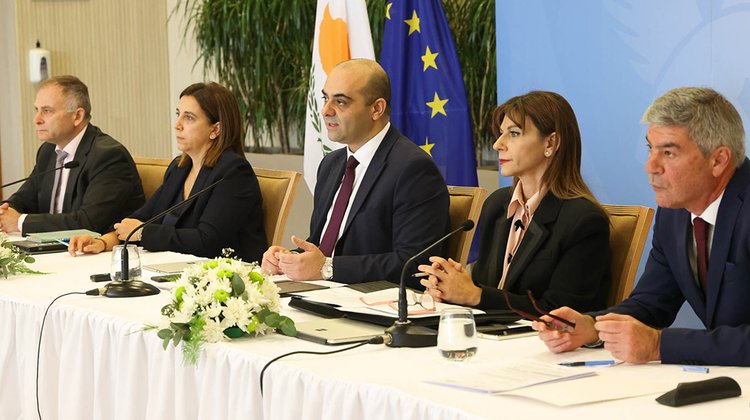Labour Minister outlines new demographic measures and timeline
15:20 - 06 November 2024

Cyprus’ government has announced a comprehensive package of measures aimed at reversing the country’s declining birth rate and addressing its ageing population, according to the Minister of Labour, Yiannis Panayiotou.
In a press conference on 6 November he presented the measures, which focus on balancing family and professional life, increasing birth rates, and improving the ratio of workers to retirees.
Accompanied by Deputy Ministers of Social Welfare Marilena Evangellou and Deputy Minister to the President Irini Piki, Panayiotou outlined the second set of demographic measures and their timelines for implementation. The measures include among others extra parental leave, increased financial support for new mothers, and new employment initiatives for the unemployed. Panayiotou pointed out that demographic recovery is a national priority, as Cyprus is faced with declining birth rates.
Cyprus has seen a drop in fertility rates over the last two decades, with the average number of children per woman declining from 1.46 in 2002 to 1.37 in 2022. Additionally, the average age of first-time mothers has risen, while life expectancy has increased, creating a higher demand on pension funds with fewer younger people in employment to support the ageing population.
To address these concerns, Panayiotou’ said that the government policy was divided into three main phases, with a projected cost exceeding €100 million.
The first phase of measures, already in place, includes the extension of maternity leave by four weeks, expanded parental leave benefits, and subsidised housing for young couples. Additional incentives, include financial support for in vitro fertilization, larger child benefits for multi-child families, and subsidies for student housing and meals.
The newly announced second phase of the plan will further strengthen these benefits. For instance, Cyprus will raise the maternity benefit to €1,000 for a first child, €1,500 for a second, and €2,000 for a third, effective retroactively from October 1, 2024. Additionally, eligibility for parental leave will be extended, with parents able to take leave until their child turns 15.
To further encourage family growth, workplace nurseries will be subsidised, allowing more flexibility for working parents. These programmes are expected to roll out in mid-2025, with expanded nursery hours set to accommodate working parents until 7:30 pm, beginning in the third quarter of 2025.
Boosting employment to support population growth
The government has outlined several employment initiatives to increase labour force participation and reduce unemployment among younger and older workers. These initiatives target women, people under 30, and those over 50, providing wage subsidies and vocational training. To further encourage youth employment, the government is supporting paid internships and seasonal employment opportunities for students.
Moreover, financial support will be provided to young mothers under 30 who receive childbirth benefits, with a monthly subsidy of €200 for 24 months to ease financial burdens early in parenthood. A programme similar support to unemployed women and older job seekers is set to begin in early 2025.
To coordinate these measures, the National Organisation for Demographic and Family Policy will undergo restructuring to more effectively address population challenges, supported by resources from the European Commission’s demographic toolkit. Panayiotou noted that a meeting of the organization is scheduled for Thursday to discuss next steps.
According to Deputy Minister of Welfare Marilena Evangellou, this policy framework is a collaborative effort involving multiple government ministries.
“Our approach is to integrate services with benefits,” she explained, stressing the importance of providing extensive childcare options to help parents balance work and family life.
The government also intends to better integrate legal immigration into its demographic policies. Panayiotou highlighted a recent reduction in illegal immigration and a parallel expansion of legal immigration, particularly to support workforce needs.
The Minister also said that the government would track progress using key demographic indicators, aiming to assess the impact of these measures and prepare for additional steps as needed. Panayiotou expressed optimism about the potential of the new policies to reshape Cyprus’s demographic landscape, noting that ongoing dialogue with citizens and young people will help refine future initiatives.
(Source: CNA)

